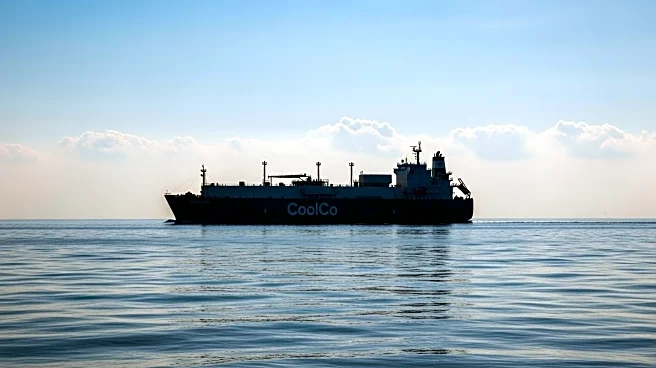What's Happening?
Eastern Pacific Shipping (EPS) is in advanced discussions to acquire the remaining shares of CoolCo, a publicly traded LNG carrier company. EPS currently owns a majority stake in CoolCo and is offering $9.65 per share for the 41% of stock it does not own, representing a 26% premium to the recent closing price. This move is driven by the evolving LNG market, where analysts predict an oversupply due to increased production and exports, particularly from the United States. The U.S. is also considering a requirement for LNG exports to be carried on U.S.-flagged vessels, adding pressure to the market dynamics. CoolCo, originally spun off from Golar LNG in 2022, has grown rapidly and now owns a fleet of 13 LNG carriers. EPS aims to consolidate its position in the LNG market through this acquisition, leveraging its relationship with shipyards and financial institutions.
Why It's Important?
The acquisition of CoolCo by EPS is significant as it reflects the strategic shifts in the LNG market, particularly in response to potential regulatory changes in the U.S. The consolidation could strengthen EPS's position in the global LNG shipping industry, allowing it to better navigate the anticipated oversupply and regulatory challenges. For CoolCo shareholders, the offer represents a substantial premium, providing an attractive exit option amid uncertain market conditions. The move also highlights the importance of strategic partnerships and corporate restructuring in adapting to market changes, which could influence other players in the LNG sector to consider similar consolidation strategies.
What's Next?
The Board of Directors of CoolCo has established an independent Special Committee to review and negotiate the terms of the transaction. If the acquisition proceeds, EPS will likely focus on optimizing its fleet operations and exploring further growth opportunities in the LNG market. The potential U.S. regulation requiring LNG exports on U.S.-flagged vessels could prompt EPS to adjust its operational strategies to comply with new shipping requirements. Additionally, the acquisition may lead to increased competition among LNG carriers, prompting other companies to consider mergers or acquisitions to enhance their market positions.









